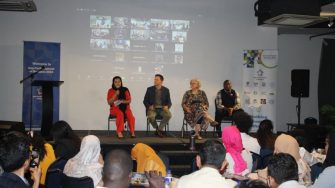Kaldor Centre joins push to secure refugee participation in international refugee law
A new global working group is developing an independent declaration affirming the right of refugees to actively participate in decisions affecting them.
A new global working group is developing an independent declaration affirming the right of refugees to actively participate in decisions affecting them.

In recognition of the need for refugees to have a voice in decisions that shape their lives, a new global working group of refugee experts, academics, humanitarians and international lawyers is collaboratively developing an independent declaration affirming the right of refugees to actively participate in decisions affecting them.
The Kaldor Centre’s Senior Research Associate Dr Tristan Harley and affiliate Brian Barbour were in Malaysia for the launch of the working group on 19 May at the Asia Pacific Summit of Refugees. The Kaldor Centre is among several organisations committing institutional support to this initiative, a collective effort seeking to address a significant void in international law and policy.
There has been growing recognition of the importance of ensuring meaningful refugee participation in recent years. This has followed years of sustained refugee-led advocacy, and can be seen in diverse sites of governance, such as UNHCR meetings, government advisory committees and refugee camps. Yet, despite these developments, the international legal frameworks do not currently address this issue in full.
The Global Compact on Refugees, endorsed by 181 countries in December 2018, asserts that responses to refugee crises are most effective when they actively involve and meaningfully engage those they seek to protect and assist. However, like other relevant international law instruments, it stops short of providing actionable steps for implementation or establishing explicit obligations on states to enable this inclusion.
The newly formed Working Group aims to address this gap by developing an independent declaration that enunciates a right of refugees to participate in decisions that impact their human rights and provides clearer guidance around refugee participation for States, NGOs, and relevant stakeholders.
Bringing together a diverse group of experts, the Working Group will leverage its collective knowledge and global expertise to drive important law reform.
‘We hope to contribute to a global refugee response that is accountable, legitimate, transparent, sustainable and impactful, addressing a significant void in international law’s protection and empowerment of (forcibly) displaced people,’ the group said in a statement. ‘We recognise that international law reform is not the only solution to this issue, but it is an important part of the solution’.
The group noted that it was important that this initiative was launched in a region hosting a large number of refugees and at a major refugee-led event that brings together refugee representatives, governments, NGOs and other key stakeholders. ‘Too often, international law reform relating to refugees is developed in locations such as Geneva and New York that are distant from where refugees are situated.’
The Working Group intends to participate in future regional and international events to engage in advocacy efforts with relevant stakeholders and invite feedback to ensure transparency and accountability. The consultations will inform the draft and launch of the independent declaration that will represent a significant contribution toward the standardisation of refugee participation in international decision-making.
For media inquiries or further information about the Working Group, please contact its Secretary General, Baqir Bayani, at baqir@actforpeace.org.au.
For more information, contact the Kaldor Centre for International Refugee Law.